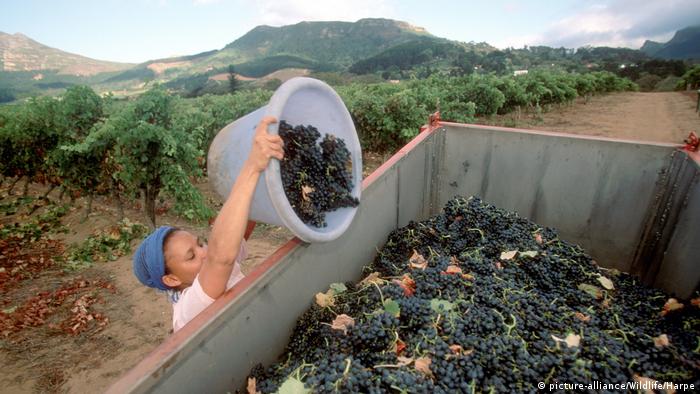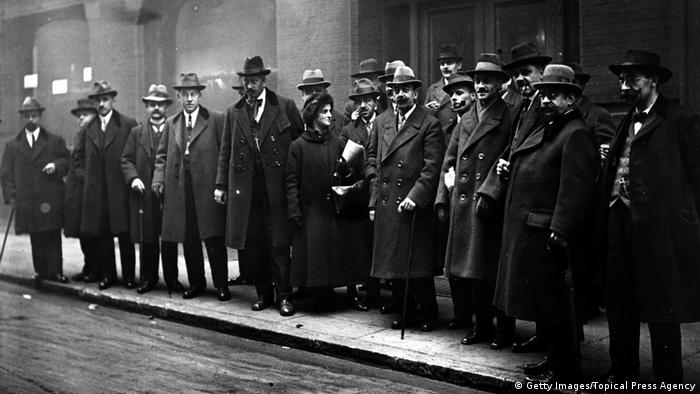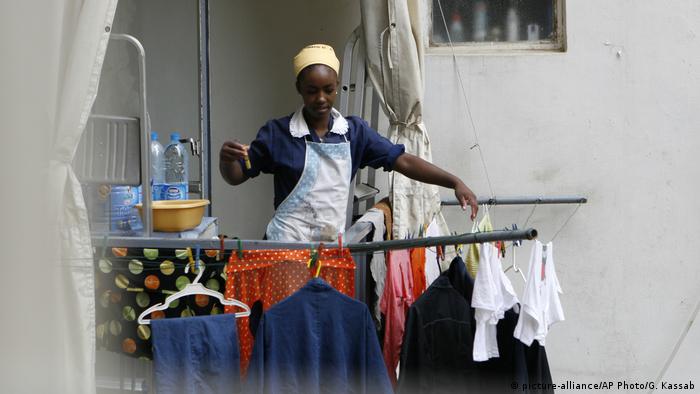Since 1919, the International labour organization promotes social justice. However, especially in Africa, there is still much to do. Youth unemployment and Migration, the ILO is facing new challenges.

A land worker during the wine harvest in South Africa
Actually, says Benjamin Luig, have South African workers since the end of Apartheid clearly defined rights. However, for many farm workers in the citrus and Wine plantations in the West and South of the country, the everyday look is often different. “The job protection is not guaranteed, there are deductions arbitrary wage and the social relations between the managers of the farms, and workers often have a colonial character. A lot of runs on pressure and threat, because the workers live there with their families and are thus in a dependent relationship,” said Luig, who works in Johannesburg as a programme Manager for the Rosa Luxemburg Foundation.
“I was recently on a citrus farm, a pregnant worker where the legal parent has been denied protection. Many of the corrugated iron huts in which the workers live, there were only three or four meters of the fields, to the highly toxic pesticides applied,” says Luig. And he adds: “As the best certification of products, nothing helps.”
One reason for the poor working conditions of The producers are under great pressure by the European market. “The supermarkets at the end of the supply chain determine the price”, says Luig. It is all the more important, therefore, that there would be more and more comprehensive government controls, more Training and support for unions. Luig is willing to accept the UN-organization in the duty, the issues of social justice and decent work, has written conditions on the flags: the International labour organization (ILO).

Delegates at the London ILO conference in 1920: social justice in the view
100 Years Of The International Labour Organization
This Thursday (11.4.2019) celebrates the ILO 100. Birthday. From the beginning, your project was so visionary and ambitious: governments, employers and trade unions should set out in the ILO’s international Standards for the world of work – and at the same time their adherence to ensure. That business and government were allying representatives at all to the fact that the topic of social justice was firmly in the newly established League of Nations, due to the circumstances after the first world war: In the shadow of the Russian October revolution of 1917, the labor movement won it all. Without concessions to the unions was not to think of peace in Europe.
In fact, the ILO could look back on some important achievements and improvements, says Benjamin Luig, and is reminiscent of the enforcement of the right to freedom of Association in agriculture as early as 1921. “In the course of the 20th century. Century, the ILO conventions, the labour rights are clearly defined goods, particularly in agriculture, leading the way,” he explains. However, in the agricultural sector, the ILO can be found in the 1990s, then your programs.
Luig also criticized, that the ILO have focused their work at the time, to a vague “decent work”Agenda, which have kept the neo-liberal Mainstream and its cuts to employment rights and social systems. However, “In the past ten years, the ILO tried again much stronger, to support workers in rural areas through training programs”, says Luig. The Organisation does receive, however, of its member States, including Germany, to little resources.
The future of work to organize
The ILO wants to to your 100. The anniversary not only look back, but mainly forward. With its Initiative “future of work” wants to make the UN-organization, changes in the working world to social justice in Africa, says Peter van Rooij, Director of ILO office in Nigeria. “Youth unemployment is a major challenge. Africa is a young continent, and training is important,” says van Rooij in the DW-Interview. To be able to the adolescents offer a perspective, there is still much to do. “More young people will have no Jobs, when they flock to the labour market.” A: On the search for Jobs, young people leave, more and more their home countries, the number of labour migrants is increasing.
“We need to concrete work with the industry and the target countries of the migrants,” says van Rooij. To not neglect the qualifications of the migrants, should also be used in other countries. The youth is the capital of the continent, therefore, the ILO seeks to support the young Potential wider – for example, with support for those who want to become self-employed.

Many Ethiopians work in Arab countries as domestic workers without access to social Rights
Social protection for migrants
Also in social protection, the increasing labour migration, the ILO is facing new challenges. Thus, according to the Ethiopian labour and social Affairs between 2008 and 2013, about 460,000 people of Ethiopia in countries such as Saudi Arabia, Kuwait, Qatar or the United Arab Emirates emigrated – the vast majority of whom are women, working in these countries as domestic workers. Studies of the ILO documented that many of the migrants suffer from poor working conditions and no social protection.
The ILO agreements for work migrants the same rights as for native workers: the case of the remuneration, social benefits and legal protection, for example, in the case of illness or maternity. In order to implement these guidelines, the ILO aimed to influence political decision-makers, and supports projects that aim to improve the conditions on the ground.
Even 100 years after its founding, the tasks of the ILO remain ambitious. Still large gaps between the standards set gape in many places, their Transfer into national law books and reality. “There has been a lot of positive changes,” says ILO-man van Rooij, with a view to the past century. But he adds: “There is still much to be done.”